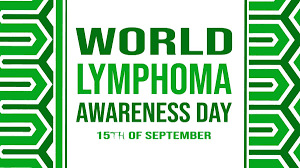World Lymphoma Awareness Day 2023 observed on 15 September

World Lymphoma Awareness Day 2023 observed on 15 September: World Lymphoma Awareness Day (WLAD) is commemorated annually on September 15th.It is dedicated to increasing awareness about lymphoma, a group of blood cancers that affect the lymphatic system, a crucial part of our immune system. Lymphomas can be classified into two types: Hodgkin lymphoma and non-Hodgkin lymphoma.
Daily Current Affairs Quiz: September 2023
Significance of World Lymphoma Awareness Day
1. Education
WLAD strives to educate the public about lymphoma, including its types, symptoms, risk factors, and available treatment options. Increased awareness can lead to earlier diagnosis and better outcomes for individuals battling lymphoma.
2. Support and Information
This day provides vital support and information to lymphoma patients and their families. It helps them understand the disease and discover available resources to navigate their journey.
3. Research
WLAD emphasizes the importance of ongoing research into lymphoma. Advancements in treatment and improved survival rates often result from dedicated research efforts.
4. Reducing Stigma
Lymphoma, like many health conditions, can carry a stigma. WLAD combats this by providing accurate information and promoting understanding and empathy toward those affected by the disease.
5. Advocacy and Fundraising
Advocacy efforts are encouraged to improve access to quality healthcare for lymphoma patients. WLAD also serves as a platform for fundraising initiatives that support research and patient support programs.
History of World Lymphoma Awareness Day
WLAD’s roots can be traced back to the founding of the Lymphoma Coalition in 2002. This international network brought together lymphoma patient organizations from around the world to collaborate, share resources, and advocate for lymphoma patients.WLAD was established in 2004 to coincide with the establishment of the Lymphoma Coalition. Since then, it has been a global endeavor to raise awareness about lymphoma and its impact on patients.
What is Lymphoma?
Lymphoma is a type of cancer that affects the lymphatic system, a critical part of our body’s immune system. To comprehend lymphoma, it’s essential to break it down:
1. The Lymphatic System: The lymphatic system functions similarly to the body’s “security team.” It consists of lymph nodes, lymph vessels, the spleen, and bone marrow, all of which collaborate to combat infections and diseases.
2. Abnormal Cell Growth: Lymphoma occurs when certain white blood cells, called lymphocytes, grow abnormally. Instead of helping the body fight infections, these cells start multiplying out of control.
3. Two Main Types: There are two primary types of lymphoma: Hodgkin lymphoma (HL) and non-Hodgkin lymphoma (NHL). They differ based on the specific type of lymphocyte affected and how the cancer behaves.
4. Signs and Symptoms: Lymphoma symptoms might vary, but they frequently include swollen lymph nodes (which are typically painless), unexplained weight loss, exhaustion, night sweats, and itching.
5. Diagnosis and Treatment: Diagnosing lymphoma typically involves blood tests, imaging scans, and sometimes a biopsy. Treatment options can include chemotherapy, radiation therapy, targeted therapy, immunotherapy, or stem cell transplantation, depending on the type and stage of lymphoma.
6. Impact on the Immune System: Lymphoma can impair the immune system, making it more difficult for the body to fight infections. As a result, early detection and treatment are critical.
7. Lymphoma Is Not Contagious: It’s important to know that lymphoma is not contagious. You can’t “catch” it from someone who has it. In summary, lymphoma is a cancer that begins in the lymphatic system when certain immune cells go rogue and start growing uncontrollably. Early diagnosis and appropriate treatment can greatly improve a person’s chances of overcoming lymphoma.